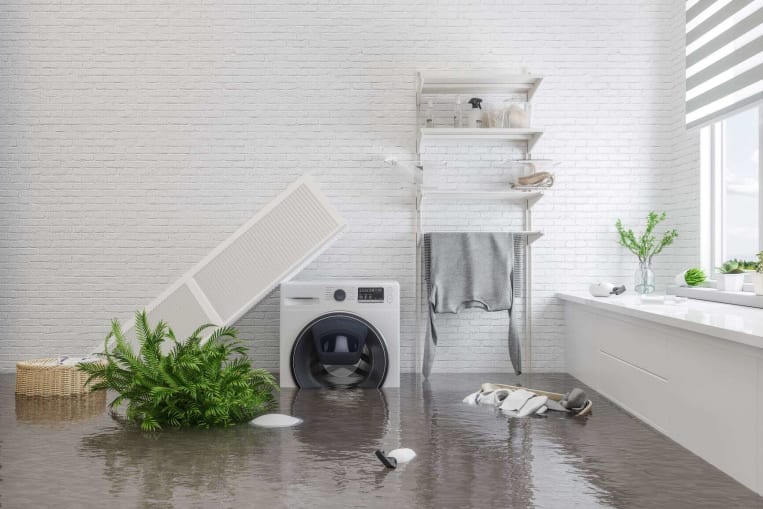
BBB Tip: House flooded? Have mold? Follow these tips

(Getty Images)
Hurricanes and other severe storms, a humid climate, leaky pipes, or continuous rain can make homes susceptible to flooding and mold.
According to the Environment Protection Agency (EPA), molds are a natural part of the environment. When excessive moisture or water accumulates indoors, mold growth will often occur, particularly if the moisture problem remains undiscovered or unaddressed.
How can you tell if you have mold in your home? The EPA states that if the home smells moldy but cannot be seen if water stains are present or if you are aware of water damage, mold could also be present. Mold may be hidden in places such as the backside of drywall, wallpaper, paneling, the top side of ceiling tiles, and the underside of carpets and pads. Other possible locations of hidden mold include areas inside walls around pipes (with leaking or condensing pipes), the surface of walls behind furniture (where condensation forms), inside ductwork, and in roof materials above ceiling tiles (due to roof leaks or insufficient insulation).
Water damage restoration can be as simple as vacuuming up water and drying out a room, or it can involve rebuilding entire sections of your home. Investigating hidden mold problems may be difficult and will require caution when the investigation involves disturbing potential sites of mold growth. When contemplating the cleanup of mold or water damage, verify the extent of the problem and contact a trustworthy water damage restoration company.
Choosing a company to clean up mold
Better Business Bureau warns people to research carefully when choosing a professional to remediate flood and water damage or to clean up mold.
- Work with your insurance company. An insurance agent may be able to recommend a reliable and reputable water damage restoration company. Contact them first to determine what your insurance policy covers and the process for filing a claim. Contact your insurance company and inquire about policy coverage and specific filing requirements to initiate the claim process. If the home, business, and/or vehicle was damaged, document the damage by taking pictures or videos. Recognize the difference between flood insurance and homeowner’s insurance. Flood damage is typically caused by water on the ground before damaging your home. Water damage occurs when it causes damage before it comes into contact with the ground (broken pipes, a leaky roof, etc.). Homeowner’s insurance would likely cover these claims.
- Do what you can to mitigate further damage. Dry out and disinfect impacted areas immediately to help prevent mold. Start running fans and dehumidifiers if you have concerns about wet carpets or rugs. Consult an expert to see if carpets, rugs, and furnishings can be salvaged.
- Check the company's history with the Better Business Bureau. You can review the water damage restoration company's complaint history and details to determine if they have a track record of responding to and resolving BBB complaints at BBB.org. Always do your research first.
- Verify the company's license. Confirm the contractor is properly licensed, insured, and registered for the scope of work they will be completing. For example, simply vacuuming water and drying out a room may not need a license, but once the company starts tearing out cabinets and walls, a license may be needed.
- Make sure the business has extensive experience in cleaning up mold. Ask for references from the business and contact these references for more information. Also, ask family and friends if they have worked with a water damage restoration company or a mold remediation expert and had a favorable experience.
- Obtain at least three bids. Don't simply hire the first business that contacts you or one that offers the lowest bid; evaluate the services and offerings of at least three businesses and then make your decision.
- Understand the Assignment of Benefits contracts. Beware of contractors who claim to be insurance claim specialists and may ask you to sign an agreement to allow them to contact your insurance company and seek approval of repairs for you. Many unscrupulous businesses have tricked consumers into signing a work estimate without reading the fine print, which commits you to automatically contract with their business if your insurance claim is approved.
- Be wary of contractors going door-to-door, especially if they use scare tactics. Obtain a contract that specifies the work to be done, the price breakdown for labor and materials, and an agreed-upon timeline. Never feel pressured into signing on the spot; always seek at least three estimates before committing. Avoid paying with cash for the entire job upfront.
For more information
Find a mold removal company near you that you can trust.
Check out the BBB flooding resources.
Read these tips about purchasing flood insurance.
Learn more about floodproofing your home or business.
Related News
Still Need Assistance?
Contact Your Local BBB
Your local Better Business Bureau can assist you with finding businesses you can trust. Start With Trust®.
Additional Resources
Central Ohio BBB Business Podcast


